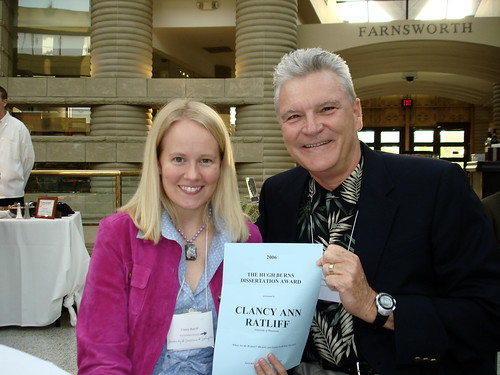I never seem to be able to stick to a hiatus.
Anyway, this has been sticking in my craw for the past couple of days. A friend recently asked me when I thought was the appropriate time (if at all) for a job candidate to express to a search committee that s/he is interested in working at that particular university for reasons having to do with location: "I want to live in a metropolitan area," "I'm from the south, and I want to stay/go back there," or the extremely important "I have/my spouse has family in the area."
Usually, a search committee will ask during an interview, "Why do you want to come to our university?" Please correct me if I'm wrong -- I would actually like to be wrong on this point -- but I've always gotten the idea that "because I have family in the area" or "because I'm from the south, and that's where I'd like to settle down" is NOT what they want to hear. Pretty much what they seem to want to hear is, "because I've always seen myself fitting in best at a(n)..."
[insert mission here:
* teaching institution with a commitment to outreach
* small liberal arts college
* HBCU
* faith-based institution
* land-grant university with support for research]
Hiring committees, in my admittedly limited experience only as a candidate, generally seem to want candidates for whom location is almost interchangeable or coincidental. I actually have answered the "why do you want to come here" question honestly before and have gotten the distinct impression that I'd said the wrong thing.
I think that not recognizing geography as a perfectly legitimate, sound reason to be interested in a job is utterly messed up for several reasons:
1. Common practice. Many applicants base their job searches on location, at least to a certain extent, and it's impractical and counterintuitive not to acknowledge that fact.
2. Getting the best information. If you have a geographical advantage when it comes to recruiting candidate X, don't you want to know that?
3. Institutional change. As we know, universities shift priorities and resources all the time. Programs are created, built up, dismantled; strategic planning initiatives are implemented; teaching universities become research universities, etc. Location is the ONE thing that, in fact, DOESN'T change. Isn't it good to know that a candidate is committed to that location and will adapt to whatever changes the university makes?
4. Retention. When professors leave positions, how often is location the only reason or one of the main reasons? How often do professors relocate to be closer to family? How often do professors leave small towns to go to cities because they're happier there? I'm going to go out on a limb here and say quite often. If you really want to live in a certain place, you're not going to be as likely to leave, especially if there aren't many universities close by. Even if there are, I'd still bet that retention rates would be higher over the long term among professors who love their locations.
That is all -- but I'd like to know what you think, particularly if you've been on a search committee. Is it okay to be up-front about the importance of location in a job search? I realize that, as a member of a SC, you don't want a marriage of convenience type of situation, but I don't think it has to be this way; moreover, I think it rarely, if ever, works out that way in practice. I'd hypothesize that if you love living where you live, you're going to be more positively predisposed toward your job, no matter what kind of institution it is.



